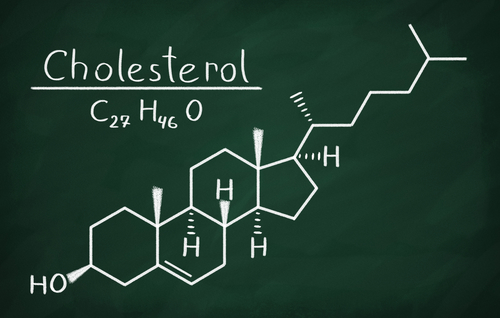Is Cholesterol Bad For You?
Short answer
Due to the fact that without cholesterol, we'd die, cholesterol cannot be said to be bad. An improper diet, however, can lead to excess amounts of cholesterol forming in the bloodstream and increase the risk of several cardiovascular-related health problems.
Very healthy and numerous health benefits. A few harmful qualities may be associated, but only under certain circumstances such as an allergic reaction.
View Full Grading System
Category 'A'
Very healthy and numerous health benefits. Side effects are rare. Things rated an 'A+' are typically necessary for survival (for example, water).
Very healthy and numerous health benefits. A few harmful qualities may be associated, but only under certain circumstances such as an allergic reaction.
Very healthy and numerous health benefits. Harmful qualities may be associated, but aren't usually serious.
It is important to note that even the best things in life can become bad in immoderate amounts. So, although something may be rated an 'A+', overconsumption/overdoing can bring unwanted effects.
Category 'B'
Very beneficial to your health. Things rated a 'B+' may have a few harmful qualities to pay attention to.
Overall beneficial to your health. Things rated a 'B' may have some harmful qualities to pay attention to.
More beneficial to your health than not. However, harmful qualities are most likely associated and shouldn't be overlooked.
The main difference between category 'A' and category 'B' is the harmful qualities typically present in 'B' items. Serious side effects are usually uncommon, but are still possible and should be taken note of.
Category 'C'
Both beneficial and harmful qualities associated. Things rated a 'C+' are typically a bit more on the beneficial side. Still, moderation is important.
A fairly even ratio of beneficial and harmful qualities. Moderation is important. Very general topics that can lean towards both sides of the spectrum will be placed here as well. Rice, for example, can be good or bad depending on the type.
More harmful than beneficial. Side effects are common, especially when consumed/done excessively. Moderation is very important.
Category 'C' usually denotes to both good and bad qualities. When it comes to this category, it is important to keep this word in mind: moderation.
Category 'D'
Harmful to your health. Although benefits may be associated, the bad most likely outweighs the good. Moderation is very important.
Harmful to your health. A few benefits may be associated, but the bad outweighs the good. Moderation is extremely important.
Harmful to your health. Very few, if any, benefits are present. Things in this category should be avoided as much as possible.
Category 'D' is typically for things that are more harmful than beneficial. While consuming/doing something unhealthy once in a blue moon shouldn't hurt, we definitely recommend eliminating 'D' items as a regular part of your routine/diet.
Category 'F'
Category 'F' is for things that fail to bring anything beneficial to the table, and are very harmful to your health. We recommend completely avoiding anything in this category. Long-term side effects of 'F' items are usually very serious.
Category 'N'
'N' stands for neutral. Things placed into this category are generally (a) neither good nor bad for you, or (b) lack the necessary evidence to reach any conclusions.
Long answer
While cholesterol is linked to an increased risk of heart attack, stroke, and cardiovascular disease, the fact is it is necessary to our survival. Without cholesterol we wouldn't just feel sick or be laid up in the hospital - we'd be dead. Cholesterol, which is produced naturally in our liver (accounting for 75% of our daily need -the rest obtained from dietary cholesterol) is necessary to thousands of functions, including building the cell membrane, metabolism of fat-soluble vitamins, creation of various hormones (among them estrogen and testosterone), creation of bile that aids in digestion, etc.
Cholesterol must be carried to the various cells via the blood stream from the liver. It does this by binding to lipoproteins. LDL (low-density lipoprotein) is small, hard, and dense. It is responsible for bringing cholesterol from the liver to the cells where it can perform its function. LDL is also known for creating clots and plaque, narrowing the arteries, which can lead to various problems. This happens, however, primarily as a result of the body trying to heal itself. When blood sugar spikes occur, insulin causes inflammation and cholesterol is sent by the liver (via LDL) to quell the inflammation. When the inflammation does not die down, more cholesterol (and hence more LDL) is sent. HDL (high-density lipoprotein), by contrast, is large, light, and soft and carries excess cholesterol from the bloodstream back to the liver.
The types of foods we eat affect the role (positive or negative) cholesterol plays in our health. For instance, saturated fats - long thought to have been complicit in heart disease - actually help reduce levels of LDL. Furthermore, carbohydrates have been found to lower both HDL and LDL levels. Meanwhile, trans fats lower HDL levels while raising LDL levels (meaning that there is less HDL to get rid of the cholesterol that LDL takes from the liver).
Overall, it isn't cholesterol itself that causes health problems. Rather, it is a diet of the wrong fats, and especially the consumption of sugar, that leads to a reaction involving cholesterol that can have unintended consequences. By itself, cholesterol is a necessary part of life.
Possible long-term side effects
- high cholesterol
-
heart disease
-
stroke
-
heart attack
Benefits
- building block of several hormones
-
building block of biles that aid in digestion
-
building block of cell membranes
-
necessary to thousands of bodily functions
-
keeps us alive, literally
Please turn your Ad Blocker off to see this content. Thank you!
Thank you for your feedback!
Written by Jeff Volling
Published on: 01-09-2016
Last updated: 12-10-2016
Thank you for your feedback!
Written by Jeff Volling
Published on: 01-09-2016
Last updated: 12-10-2016


 Approved by
Approved by 














